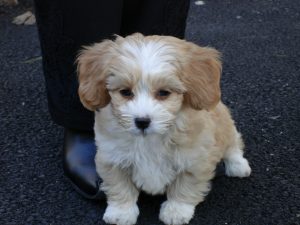 Choosing a pet can be a difficult decision for any family, but it is especially hard for apartment-dwellers. Generally, apartments are smaller and do not provide as much room to move around as houses do, which can present problems for larger dogs or dogs that prefer wide-open spaces to run around. Additionally, apartments tend to have more outside noise from neighbors, which can agitate certain dogs. As a result, some breeds may be more inclined to bark and disturb other neighbors.
Choosing a pet can be a difficult decision for any family, but it is especially hard for apartment-dwellers. Generally, apartments are smaller and do not provide as much room to move around as houses do, which can present problems for larger dogs or dogs that prefer wide-open spaces to run around. Additionally, apartments tend to have more outside noise from neighbors, which can agitate certain dogs. As a result, some breeds may be more inclined to bark and disturb other neighbors.
This is why it is extremely important to understand what kind of dog you are looking for and do your research about different breeds before making a decision. While generalizations about different breeds are extremely helpful, every dog is different, so it is important to know that these stereotypes and characteristics do not hold true for every dog. Sometimes you may find a dog that is extremely friendly and gentle, even though they’re breed is not known for it. Similarly, you may find a dog that is the opposite, even though they’re breed is considered a good pet for families.
In any case, to ensure the safety and tranquility of your family and apartment, it is best to know how certain breeds generally behave around strangers, children, other animals, and even furniture. Additionally, it is good to know which breeds make the best guard dogs, as many families want to have a pet that can protect their home, without disturbing the other inhabitants of the apartment on a regular basis. In order to best evaluate how well certain dog breeds fit into a smaller living space, there are a few important criteria that we must look at:
- Size – For some people, the size of a dog is not all that important. However, if you’re family lives in a smaller space, a larger dog may be inconvenient or simply impractical. Additionally, if you have small children, you may not want a larger dog, as it could inadvertently injure your child. In some cases, smaller dogs can also be undesirable for a family living in small quarters. If there are older people in the home who have trouble getting around, it may be hazardous to have a small dog underfoot all of the time. However, for most apartments, a smaller dog is preferable, as there simply may not be enough space for a larger breed.
- Energy Level – Sometimes, though certainly not in every case, energy level is linked to breed and size, with larger dogs being more docile, and smaller dogs being more energetic. Generally, families will want a calmer animal around the apartment, as a dog that is more excitable may disturb neighbors or make it difficult to sleep due to barking. However, families with children may want a dog who is high energy and loves to play, so the interests of each family are very important when choosing the right breed.
- Temperament – This refers to a dog’s overall personality. Dogs that form stronger bonds with people are preferable for families in general. It is also important that family dogs are not too aggressive. Additionally, certain breeds have inherent traits that may be desirable or undesirable for certain families. In apartments, it is best to have dogs that do not bark excessively without provocation, and are not easily bored or sad in closed environments.
- Trainability – While trainability is harder to gauge, it is very important. Breeds that are difficult to train can end up causing excessive damage to the apartment or engaging in unwanted behavior, like chewing on furniture, barking, or going to the bathroom indoors.
So, keeping in mind the qualities that make a dog suitable for an apartment, let’s take a look at the top breeds for apartment-dwelling individuals and families:
Greyhound
It may come as a huge surprise that the fastest dog in the world makes for a good apartment pet, but it is actually true. When greyhounds are not zooming around the local park, they like to relax on the couch for hours on end, and are very well-behaved indoors.
- Size – While they are extremely skinny, greyhounds are actually quite large, standing between 70-75 centimeters tall. Generally, larger dogs are not ideal for apartments, as they can take up too much space and feel cramped, but greyhounds are able to curl up in just about any setting.
- Energy Level – Obviously, greyhounds love to run. They are extremely fast, and they definitely need to burn off some energy from time to time. However, once they get it out of their system, greyhounds can be extremely lazy.
- Temperament – Though greyhounds switch between very high and very low energy, they are generally very happy and docile animals. Additionally, they don’t make a lot of noise, so they are unlikely to disturb the neighbors.
- Trainability – Thanks to their use in dog racing, greyhounds are very receptive to training. They are obedient, loyal, and very intelligent animals.
Bichon Frise


 The Bichon Frise is a very cute and fun companion for any pet owner, no matter where they live, but this breed is particularly good for apartment-dwellers. They are small and do not require wide-open spaces as much as some other breeds, and are extremely friendly with just about everyone.
The Bichon Frise is a very cute and fun companion for any pet owner, no matter where they live, but this breed is particularly good for apartment-dwellers. They are small and do not require wide-open spaces as much as some other breeds, and are extremely friendly with just about everyone.
- Size – This breed is very small, weighing in at about 4 kilos as an adult. This makes them easy to pick up and carry when going out, and unlikely to knock something over or cause damage to the furniture.
- Energy Level – Bichon frise can have a lot of energy sometimes, though they are relatively calm compared to most other small breeds. While they still need the opportunity to run around and play outside, the bichon frise is generally considered the ideal lap dog.
- Temperament – This breed is known for being friendly and loving. They become very attached to their owners or families, and they always want to be with other people and animals. They are very social by nature, so if there won’t be anyone in your apartment for many hours and you cannot take them with you, it is best to get a companion dog for your bichon frise.
- Trainability – Bichon frise do not usually need much training for behavior like barking or being aggressive, though they will need to be house trained like most breeds. Thankfully, if the training is started at an early age, this breed is pretty open to being trained.
Shih Tzu
Shih Tzu’s are a household favorite for many families, and they have the perfect size and temperament for apartments. Though shih tzu’s can sometimes have a high-pitched bark, they are not aggressive and do not get agitated easily.
- Size – This breed is very small in stature, and generally does not weigh more than 7 kilograms as an adult. Easy to pick up and carry, shih tzus are great as lap dogs and are easy to bring along on road trips.
- Energy Level – Shih Tzu’s enjoy going for walks and spending time with people, but they are not usually high energy. Instead, they prefer to laze around and relax for the majority of the day, though they still need to play and socialize like any other breed.
- Temperament – Shih Tzus are docile, and though they may not always get along with other dogs, they do love people. Shih Tzus are very protective of their families. They may not be intimidating, but their high-pitched bark can alert their owners of an intruder, making them a surprisingly effective guard dog.
- Trainability – For the most part, shih tzus are receptive to training. In some cases, there may be issues with scratching on carpet or furniture, but this can be corrected without too much difficulty.
Maltese
The Maltese are another small breed that is full of energy but doesn’t mind being a lap dog. While this breed might like to zoom around apartments, they are small and light, so they are unlikely to cause damage or disturb the neighbors.
- Size – This breed is small, weighing just 3-4 kilograms full grown. This makes them great for people who have a very small apartment, and simply do not have space for a larger pet.
- Energy Level – Though it is true that these dogs have lots of energy and love to run around, they don’t necessarily need wide-open spaces to have fun. They should be taken outside for exercise whenever possible, but they are just as happy snuggling up on the couch.
- Temperament – The Maltese is a very social breed, and really enjoys interactions with humans and animals alike. They need to burn off a lot of energy by playing with someone, so this breed is not ideal for people who leave the house empty for hours on end.
- Trainability – Maltese are not as receptive to training as some other breeds, but they are also pretty well-behaved by nature. It may not be possible to stifle their energy level, but they can certainly be house trained.
Boston Terrier
The Boston Terrier is a popular breed, and for good reason; this dog is loyal and loves to be around people as much as possible. In addition, Boston terriers can be very easily trained.
- Size – The Boston terrier is a small breed that is similar in height and weight to the French bulldog, weighing anywhere between 5-10 kilograms. They are easy to pick up, but they have a lot of energy, and they may not want to be carried for extended periods of time.
- Energy Level – Boston terriers are high energy, so they require a lot of time outside with plenty of space to run around. They also like to play a lot, and do not enjoy extended periods of rest as much as some other breeds.
- Temperament – This breed is a lot of fun because they always aim to please. They want to play with other animals and people as much as possible, and make great companions for people who like to live an active lifestyle.
- Trainability – This breeds is definitely receptive to training, and despite the high energy, the are generally not aggressive.
While this list includes some of the top breeds for apartments, is by no means comprehensive. There are many other dog breeds and individual dogs that are perfect for apartment living. Additionally, it is very important to note that pet owners do not need “pure breeds” in order to have a loving relationship with their pet in a smaller living space. “Mutts” make some of the best companions in the world, so don’t be afraid to mix things up when you are looking to adopt!